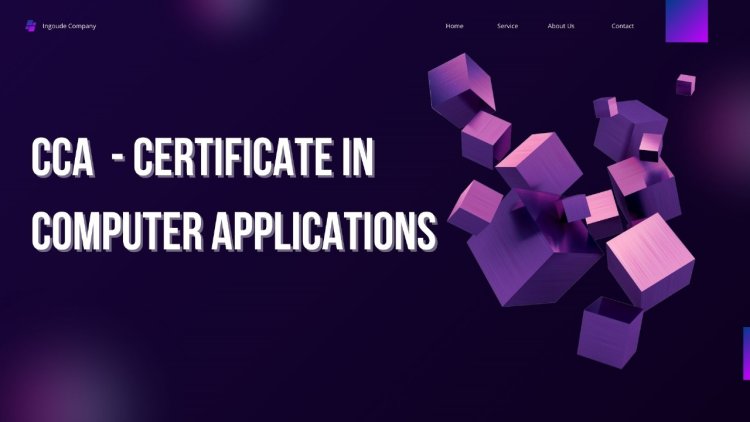How CCA Courses Foster Technical Creativity in Student

In today’s rapidly evolving digital landscape, technical creativity is a prized asset. Certificate in Computer Application (CCA) courses have emerged as a crucial stepping stone for students aspiring to excel in the tech world. These courses blend foundational technical skills with creative problem-solving, encouraging students to think innovatively while mastering practical tools and applications.
This article explores how CCA courses, designed to introduce students to the world of computer applications, serve as a platform for fostering technical creativity.
Understanding the Foundation: What is CCA?
Before diving into how these courses nurture creativity, it's essential to grasp the basics. The CCA full form is Certificate in Computer Application, a short-term program aimed at equipping students with fundamental computer skills. It covers areas like MS Office, internet applications, data handling, and basic programming, making it ideal for beginners or professionals looking to upskill.
While the course emphasizes practical knowledge, its structure inherently promotes creative thinking, enabling students to apply their technical expertise in unique ways.
1. Bridging the Gap Between Technology and Creativity
CCA courses provide a structured approach to understanding computers, but they do more than just impart technical knowledge. Through project-based learning, case studies, and real-world scenarios, students are encouraged to:
- Experiment with Tools: Instead of simply following predefined steps, students are urged to explore software like MS Excel, PowerPoint, and database management systems, uncovering new functionalities and applications.
- Solve Real-World Problems: By simulating real-world challenges, such as creating automated spreadsheets or designing visually appealing presentations, students combine technical skills with creative solutions.
2. Encouraging Innovative Thinking Through Projects
Projects form a cornerstone of CCA courses. Whether it’s designing a simple website, creating an interactive Excel dashboard, or developing basic programs, these activities require students to think critically and creatively. For instance:
- Web Design: Students learn HTML and basic CSS to create webpages. While the technical knowledge comes from coding, the creative element emerges when designing layouts, selecting color schemes, and ensuring user-friendly navigation.
- Data Visualization: Using tools like Excel or Power BI, students can transform raw data into compelling visual reports, requiring both analytical and creative skills.
3. Introduction to Basic Programming
Many CCA courses introduce students to basic programming languages like Python, C, or JavaScript. Coding itself is a blend of logic and creativity, as students learn to:
- Develop algorithms to solve specific problems.
- Write efficient and innovative programs for various tasks, such as automating repetitive processes or creating interactive applications.
4. Promoting Collaborative Creativity
Group projects in CCA courses allow students to collaborate, share ideas, and tackle challenges collectively. Working in teams exposes students to diverse perspectives and fosters an environment where creative solutions thrive. For instance, while one student may excel in technical aspects, another might bring a creative flair, leading to innovative outcomes.
5. Adapting to Emerging Trends and Technologies
CCA programs are designed to keep pace with technological advancements. By exposing students to tools like cloud computing, multimedia editing, or cybersecurity basics, these courses encourage them to adapt and innovate in response to industry trends. This adaptability is a hallmark of technical creativity, as students learn to think beyond conventional solutions.
6. Practical Applications in Everyday Scenarios
CCA courses focus on applications that are relevant to both personal and professional life. This practical orientation nurtures creativity, as students find innovative ways to simplify tasks or solve problems. Examples include:
- Automating financial calculations using Excel.
- Designing professional-grade presentations for job interviews or projects.
- Creating databases for personal or business use.
Why CCA is Different from Traditional Courses
Unlike traditional academic programs, CCA courses emphasize hands-on learning and real-world applications. This focus on practicality fosters a mindset of exploration and experimentation, essential for technical creativity.
How CCA Differs from BCA and PGDCA
While the BCA full form is Bachelor of Computer Applications, a more comprehensive undergraduate program, and PGDCA (Post Graduate Diploma in Computer Applications) offers advanced knowledge, CCA is a short-term course designed for beginners. Despite its compact format, CCA excels in promoting creativity by focusing on foundational skills and their innovative applications.
Benefits of CCA Courses in Nurturing Creativity
- Short Duration, Long Impact: CCA courses typically last 3 to 6 months, making them a quick and effective way to gain technical skills while fostering creativity.
- Accessibility: These courses are open to students from various backgrounds, ensuring a diverse learning environment.
- Cost-Effective Learning: Compared to longer programs, CCA courses are more affordable, making technical education accessible to a broader audience.
Conclusion
CCA courses stand out as a powerful tool for fostering technical creativity in students. By combining foundational computer knowledge with opportunities for innovation, these programs prepare students to excel in the digital age. Whether you're a student exploring career options or a professional looking to enhance your skill set, a CCA course can unlock new horizons of creativity and technical expertise.
FAQs About CCA Courses
Q1: What is the CCA full form?
The CCA full form is Certificate in Computer Application, a short-term course that focuses on essential computer skills.
Q2: How does CCA promote creativity?
CCA courses encourage creativity through project-based learning, problem-solving tasks, and exposure to real-world applications.
Q3: Can I enroll in a CCA course without prior computer knowledge?
Yes, CCA courses are designed for beginners, making them accessible to students with little or no technical background.
Q4: How does CCA differ from BCA and PGDCA?
While BCA and PGDCA are more advanced and comprehensive, CCA is a short-term course focused on foundational computer skills and their practical applications.
What's Your Reaction?
















